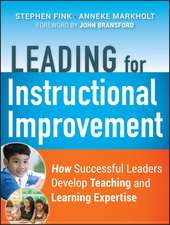How School Leaders Contribute to Student Success: The Four Paths Framework: Studies in Educational Leadership, cartea 23
Editat de Kenneth Leithwood, Jingping Sun, Katina Pollocken Limba Engleză Hardback – 24 mar 2017
While considerable evidence indicates that school leaders are able to make important contributions to the success of their students, much less is known about how such contributions are made. This book provides a comprehensive account of research aimed at filling this gap in our knowledge, along with guidelines about how school leaders might use this knowledge for their own school improvement work.
Leadership practices known to be effective for improving student success are outlined in the first section of the book while the remaining sections identify four “paths” along which the influence of those practices “flow” to exercise an influence on student success. Each of the Rational, Emotional, Organizational and Family paths are populated by conditions or variables known to have relatively direct effects on student success and also open to influence by effective leadership practices.
While the Four Path framework narrows the attention of school leaders to a still-considerable number conditions known to contribute to student success, it leaves school leaders the autonomy to select, for improvement efforts, the sub-set of conditions that make the most sense in their own local circumstances. The approach to leadership described in this book provides evidence-based guidance on what to lead and flexibility on how to lead for purposes of improving student learning.
| Toate formatele și edițiile | Preț | Express |
|---|---|---|
| Paperback (1) | 948.29 lei 6-8 săpt. | |
| Springer International Publishing – 7 aug 2018 | 948.29 lei 6-8 săpt. | |
| Hardback (1) | 954.45 lei 6-8 săpt. | |
| Springer International Publishing – 24 mar 2017 | 954.45 lei 6-8 săpt. |
Din seria Studies in Educational Leadership
-
 Preț: 279.93 lei
Preț: 279.93 lei - 15%
 Preț: 638.76 lei
Preț: 638.76 lei - 18%
 Preț: 947.50 lei
Preț: 947.50 lei - 15%
 Preț: 637.28 lei
Preț: 637.28 lei - 15%
 Preț: 636.12 lei
Preț: 636.12 lei - 15%
 Preț: 635.01 lei
Preț: 635.01 lei - 24%
 Preț: 932.28 lei
Preț: 932.28 lei - 18%
 Preț: 945.47 lei
Preț: 945.47 lei - 20%
 Preț: 559.44 lei
Preț: 559.44 lei - 18%
 Preț: 1104.88 lei
Preț: 1104.88 lei - 15%
 Preț: 637.13 lei
Preț: 637.13 lei - 15%
 Preț: 638.11 lei
Preț: 638.11 lei - 15%
 Preț: 638.43 lei
Preț: 638.43 lei -
 Preț: 397.59 lei
Preț: 397.59 lei - 15%
 Preț: 660.04 lei
Preț: 660.04 lei - 15%
 Preț: 654.12 lei
Preț: 654.12 lei - 24%
 Preț: 701.95 lei
Preț: 701.95 lei - 18%
 Preț: 731.41 lei
Preț: 731.41 lei - 15%
 Preț: 640.88 lei
Preț: 640.88 lei - 15%
 Preț: 640.71 lei
Preț: 640.71 lei - 18%
 Preț: 946.55 lei
Preț: 946.55 lei - 15%
 Preț: 643.34 lei
Preț: 643.34 lei - 15%
 Preț: 645.28 lei
Preț: 645.28 lei - 15%
 Preț: 639.73 lei
Preț: 639.73 lei - 15%
 Preț: 635.31 lei
Preț: 635.31 lei
Preț: 954.45 lei
Preț vechi: 1163.97 lei
-18% Nou
Puncte Express: 1432
Preț estimativ în valută:
182.66€ • 189.99$ • 150.79£
182.66€ • 189.99$ • 150.79£
Carte tipărită la comandă
Livrare economică 12-26 aprilie
Preluare comenzi: 021 569.72.76
Specificații
ISBN-13: 9783319509792
ISBN-10: 3319509799
Pagini: 369
Ilustrații: VIII, 365 p. 26 illus.
Dimensiuni: 155 x 235 x 22 mm
Greutate: 0.7 kg
Ediția:1st ed. 2017
Editura: Springer International Publishing
Colecția Springer
Seria Studies in Educational Leadership
Locul publicării:Cham, Switzerland
ISBN-10: 3319509799
Pagini: 369
Ilustrații: VIII, 365 p. 26 illus.
Dimensiuni: 155 x 235 x 22 mm
Greutate: 0.7 kg
Ediția:1st ed. 2017
Editura: Springer International Publishing
Colecția Springer
Seria Studies in Educational Leadership
Locul publicării:Cham, Switzerland
Cuprins
1. Introduction; Kenneth Leithwood, Jingping Sun and Katina Pollock.- Section One: The Nature of Successful Leadership.- Section introduction.- 2. A Model of Successful School Leadership from the International Successful School Principalship Project; David Gurr.- 3. The Ontario Leadership Framework; Kenneth Leithwood.- Section Two: The Rational Path.- Section introduction.- 4. Leadership and Learning: Conceptualizing Relations between School Administrative Practice and Instructional Practice; James Spillane.- 5. Effects of Distributed Leadership on School Academic Press and Student Achievement; John Malloy and Kenneth Leithwood.- 6. Towards Sustaining Levels of Reflective Learning: How Do Transformational Leadership, Task Interdependence, and Self-Efficacy Shape Teacher Learning in Schools?; Arnoud Oude Groote Beverborg, Peter J. C. Sleegers, Maaike D. Endedijk and Klaas van Veen.- Section Three: The Emotional Path.- Section introduction.- 7. Leadership Effectson Student Learning Mediated by Teacher Emotions; Jingping Sun and Kenneth Leithwood.- 8. Principals, Trust, and Cultivating Vibrant Schools; Megan Tschannen-Moran and Christopher R. Gareis.- 9. Generation X School Leaders as Agents of Care: Leader and Teacher Perspectives from Toronto, New York City and London; Karen Edge.- Section Four: The Organizational Path.- Section introduction.- 10. Complexity and Volume: An Inquiry into Factors that Drive Principals’ Work; Katina Pollock, Fei Wang and David Cameron Hauseman.- 11. Creating Communities of Professionalism: Addressing Cultural and Structural Barriers; Joseph Murphy.- 12. Effects of Principal Professional Orientation towards Leadership, Professional Teacher Behavior, and School Academic Optimism on School Reading Achievement; Roxanne Mitchell and John Tarter.- 13. Leading Teacher Learning in China: A Mixed Methods Study of Successful School Leadership; Shengnan Liu and Philip Hallinger.- Section Five: The Family Path.- Section introduction.- 14. Effects of Family Educational Cultures on Student Success at School: Directions for Leadership; William Jeynes.- 15. Changing the Educational Culture of the Home to Increase Student Success at School; Kenneth Leithwood and Penny Patrician.- 16. Conclusion; Kenneth Leithwood, Jingping Sun and Katina Pollock.- References by Section introduction and Chapter.
Textul de pe ultima copertă
While considerable evidence indicates that school leaders are able to make important contributions to the success of their students, much less is known about how such contributions are made. This book provides a comprehensive account of research aimed at filling this gap in our knowledge, along with guidelines about how school leaders might use this knowledge for their own school improvement work.
Leadership practices known to be effective for improving student success are outlined in the first section of the book while the remaining sections identify four “paths” along which the influence of those practices “flow” to exercise an influence on student success. Each of the Rational, Emotional, Organizational and Family paths are populated by conditions or variables known to have relatively direct effects on student success and also open to influence by effective leadership practices.
While the Four Path framework narrows the attention of school leaders to a still-considerable number conditions known to contribute to student success, it leaves school leaders the autonomy to select, for improvement efforts, the sub-set of conditions that make the most sense in their own local circumstances. The approach to leadership described in this book provides evidence-based guidance on what to lead and flexibility on how to lead for purposes of improving student learning.
Caracteristici
Describes a well-developed and coherent framework for improving schools and student learning Adds many different perspectives from independent and well-known scholars Discusses an approach to school leadership that comes from providing evidence-based guidance















